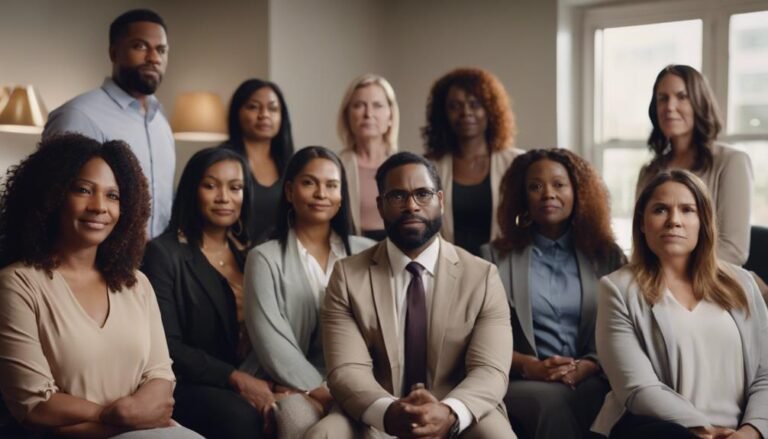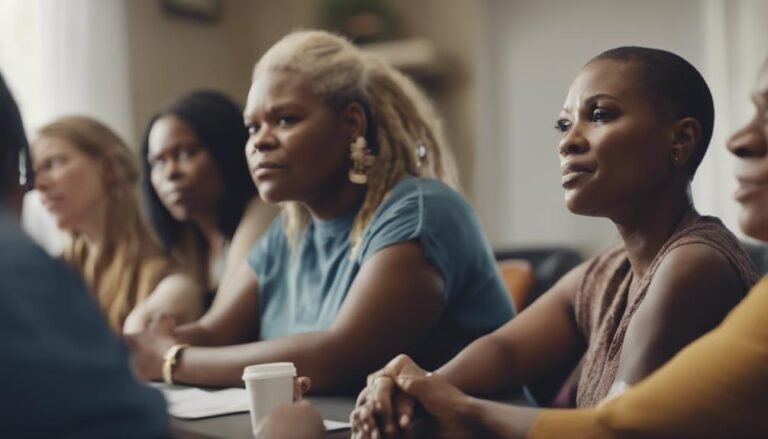When stuck in abusive relationships, I may blame myself and belittle the severity of the abuse. Emotional manipulation isolates me from support systems, creating a sense of powerlessness. Financial constraints make it tough to break free, trapping me in a cycle of dependence. Fear and safety concerns keep me from seeking help, reinforcing a cycle of abuse. Societal expectations and pressures influence my decisions to stay, often leading to feelings of duty or shame. Understanding these dynamics is key to offering support and empathy. The complexities behind why women stay in abusive relationships run deep.
Key Takeaways
- Victim blaming leads to internalized guilt and self-blame.
- Emotional manipulation and isolation create powerlessness.
- Financial constraints and dependence hinder leaving.
- Fear and safety concerns hold victims back from seeking help.
- Societal expectations and pressures influence staying in abusive relationships.
Victim Blaming and Minimization
Experiencing victim blaming and minimization can lead individuals in abusive relationships to internalize feelings of guilt and downplay the severity of the abuse they endure. Self-blame becomes a constant companion, weaving distorted thoughts that convince victims the abuse is somehow their fault.
This internalization of guilt often obscures the reality of the situation, making it challenging for victims to recognize the abuse and seek help. The insidious nature of self-blame perpetuates a cycle where victims feel undeserving of support or intervention.
Emotional Manipulation and Isolation
Emotional manipulation and isolation are common tactics used by abusers to exert control over their victims in abusive relationships. Through manipulative tactics, abusers exploit vulnerabilities, instilling fear and dependency in their victims.
By isolating them from support systems, abusers create a sense of powerlessness and alienation, making it harder for victims to seek help or escape the abusive cycle. The effects of isolation can be profound, leading to feelings of loneliness, helplessness, and disconnection from the outside world.
Victims may struggle to recognize the manipulation due to the gradual nature of these tactics, which can erode their self-esteem and confidence over time. Understanding the dynamics of emotional manipulation and isolation is crucial in supporting victims and helping them break free from abusive relationships.
Financial Constraints and Dependence
Financial constraints and dependence play a significant role in perpetuating the cycle of abuse within relationships. Many women facing abuse also struggle with financial independence, making it challenging to leave their abusers.
Economic abuse, a form of control where abusers limit access to financial resources, exacerbates this issue. Without the means to support themselves, victims may feel trapped in a cycle of abuse.
Empowerment through financial literacy and assistance programs can be instrumental in helping individuals break free from abusive situations. Addressing financial struggles and promoting independence can provide victims with the necessary resources to make informed decisions about their safety and well-being, ultimately leading them towards a path of empowerment and liberation from abusive relationships.
Fear and Safety Concerns
In abusive relationships, fear and safety concerns often hold victims back from seeking help or leaving their abusers. The trauma effects of abuse can create deep-rooted fear, making it difficult for victims to break free.
Coping mechanisms such as minimizing the abuse or prioritizing children’s safety over their own can further entrench victims in harmful situations. Children’s impact plays a significant role, as women may stay to shield their children from harm, even at the expense of their own well-being.
Support systems are essential in helping victims navigate these fears and safety concerns. Understanding the complexities of these dynamics is vital in providing the empathy and assistance needed to empower victims to seek safety and support.
Societal Expectations and Pressures

The societal expectations and pressures surrounding relationships can greatly influence why women stay in abusive situations. Gender roles and cultural norms often dictate that women should prioritize maintaining a relationship at all costs, even if it means enduring abuse.
These expectations can create a sense of duty or obligation to stay with their abuser, as leaving may be perceived as a failure or a disruption of societal norms. Additionally, societal pressures can lead to feelings of shame or judgment from others if a woman chooses to leave an abusive relationship, further complicating the decision-making process.
It’s vital to address these ingrained beliefs and norms to provide support and empowerment for women to break free from abusive situations and prioritize their own well-being.
Frequently Asked Questions
How Can Victims Rebuild Their Self-Worth After Enduring Emotional Manipulation?
To rebuild my self-worth after enduring emotional manipulation, I focus on rebuilding confidence through self-care practices, seeking therapy for healing, and surrounding myself with supportive people who validate my feelings and empower me to regain my strength.
What Resources Are Available to Help Victims Overcome Financial Constraints?
When facing financial constraints, it can seem like there’s no way out. However, with financial assistance programs and legal aid, victims can find the support needed to break free from abusive relationships and rebuild their lives.
How Do Victims Navigate Safety Concerns When Planning to Leave an Abusive Relationship?
When addressing safety concerns while planning to leave an abusive relationship, I prioritize safety planning, seek emotional healing, lean on support networks, and explore legal options. It’s important to address these aspects for a successful shift.
What Strategies Can Victims Use to Overcome Societal Pressures to Stay in Abusive Relationships?
To overcome societal pressures in abusive relationships, victims can seek support systems, attend empowerment workshops, engage in counseling sessions, and access legal assistance. These resources provide guidance, protection, and empowerment to break free from harmful environments.
How Can Victims Break Free From the Isolation Enforced by Their Abusers?
Feeling like a lone candle in the dark, I found strength in support networks and counseling services. Embracing legal options and self-care strategies, I shattered the chains of isolation to reclaim my light.
Conclusion
To sum up, the intricate web of reasons that keep women in abusive relationships is like a tangled knot that’s difficult to unravel. Despite the external pressures and internal struggles, these individuals deserve understanding and support as they navigate the complexities of leaving.
By shedding light on these challenges, we can work towards breaking the cycle of abuse and providing a path towards healing and empowerment.







